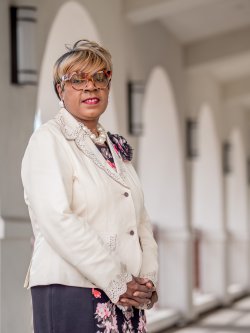Associate Director
Educational Opportunity Fund Program
When Bertha Diggs first stepped onto a college campus, she was fulfilling a dream to rise above humble beginnings. Having grown up in poverty in South Jersey, “never living in a house with indoor plumbing until I was 18,” Diggs saw her college acceptance as the opportunity of a lifetime. The fact that she was there at all was due in large measure to the civil rights movement and its promise of equality.

This was 1968, a time when New Jersey colleges and universities were predominately white institutions. As part of the inaugural class of Martin Luther King Scholars, later to become known as EOF for the Educational Opportunity Fund, Diggs paved a way for students from the poorest neighborhoods, from the most troubled school districts, to succeed when given a real chance with quality mentoring, tutoring and advising. In fact, it became her life calling.
Diggs, retiring after 34 years as the EOF associate director at Montclair State University, has been a champion of recruiting, enrolling and guiding highly-motivated students through their college years. Her tenure is remarkable. Colleagues say thousands of students from lower-income families have been impacted by her legacy and opened doors to change the course of their own lives. “She has been pivotal in helping us focus on the mission, spirit and history of the program,” says Daniel Jean, the University’s executive director of the EOF and Academic Development.
Montclair State’s EOF is one of 55 state-funded programs in New Jersey, each designed to provide support to more than 13,000 educationally and economically disadvantaged students, many the first in their families to attend college. And often, as is the case at Montclair State, it is run by people who have walked in their students’ shoes.
“For me, it’s personal and professional,” says Dr. Jean, an author, motivational speaker, playwright and poet, the city kid from Newark, who despite poor grades after his father died, rose from a 1.9 grade point average as an EOF scholar to earn his doctorate from Seton Hall University.
Retention and graduation rates are the key measures of the program’s success, and under Dr. Jean’s leadership, four-year graduation rates among EOF scholars from 2014-2016 rose 61 percent, from 29 percent to 46.8 percent. A rigorous six-week summer academy provides incoming students with skills, resources and counseling that contribute to keeping close to 90 percent of the first-year scholars in school. The summer academy is the “heart and soul” of the program, Dr. Jean says.
“You start out with people who are in your same situation, and you just get each other,” says Giavanna Caratozzolo, a freshman. “It’s not where you come from, but where you’re going with your EOF advantage. In the end that’s all that matters.”
Diggs says EOF gives students the confidence that “I belong at this college.” In return, the counselors and peer leaders provide “a support system, a sense of belonging, a sense of believing they can do it.”
The program inspires leaders like Christopher Catching ‘99, who was recruited by Diggs as a senior at Essex County Vocational and Technical High School in Newark. “She saw something special in me beyond what I saw in myself,” says Dr. Catching, the incoming vice president for Student Affairs at Stockton University. Being part of EOF on this campus “transformed my life and provided a foundation for my career as an educator. The lessons I learned from participating in the EOF program were transferable in additional to being transformational.”
Students refer to EOF as family. “It’s been a second home, says Ava Lovell ’17, “a place where I have grown academically, professionally, mentally and emotionally.”
Dominic Bowman, a senior physical education major from Camden, says his mother “put a lot into me, keeping me out of the streets, keeping me playing sports. She told me that academics were key.” When she died during his sophomore year, Bowman’s EOF counselors provided the support that kept him at Montclair State and focused. “My mother really wanted me to graduate. I think about that every day as I get closer to May,” he says.
While EOF provides that type of academic and emotional support, funding is minimal. At most, students receive $1,400 a year. They pay tuition through a variety of scholarships, grants and loans. Recruitment focuses on easing the admissions process for the first-generation scholars and their families, many of whom English is not the primary language, Dr. Jean says.
Nearly 700 students are currently enrolled as EOF scholars at Montclair State. Those who have come to know her, credit “Mamma Diggs” for her counsel, intelligence and ability to find greatness in students who often times cannot yet see it in themselves. “She has a presence about her, so you know she means business, but she also has that motherly touch to remind you that everything will be fine,” says Stanley Fils ’09, who works on campus in financial aid.
Diggs will remain busy in retirement, finishing work on her doctorate in higher education leadership and teaching psychology of leadership in the fall. “In 8th grade I knew I no longer wanted to be poor and that the only way I would achieve and have the things in life that I thought were important to me was to have an education,” Diggs says. “It’s been a good journey.”
